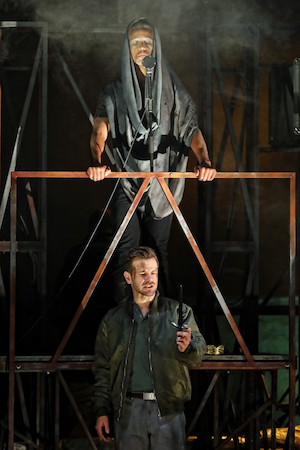Review: Bell Shakespeare, Julius Caesar ·
State Theatre Centre, August 8 ·
Review by Xan Ashbury ·
Shakespeare’s political thriller, Julius Caesar, has been asking questions about power, leadership, morality and the role of citizens since 1599. One of its key message seems to be that change can’t come from assassination because violence simply begets violence.
As a slid into my seat in the Heath Ledger Theatre this week, I realised the last show I’d seen in that venue was Stephen Sondheim’s Assassins (a musical about the dozen men and women who’ve killed or made attempts on the life of American presidents). Clearly, while Shakespeare’s plays sound a warning bell, society is often deaf to their pleas or staggeringly slow to change.
Shakespeare used the Roman setting as a way to provoke reflection on Elizabethan politics (without getting tortured or executed) and many productions of Julius Caesar since then have been staged through the lens of contemporary politics.
Under Orson Welles’s direction in 1937, Caesar and his followers donned the uniforms of fascist Italy and Nazi Germany. A production in New York last year dressed Caesar as Donald Trump, which sparked a right-wing backlash, including death threats against the cast. (One wonders whether the protestors bothered to actually see the play.)

At its heart, Julius Caesar is about the power of rhetoric – the way language can be used to persuade or manipulate or incite violence. Given the ratcheting up of heated rhetoric and violence in our post-truth, digitally connected world, Bell Shakespeare has made a timely choice.
Directed by James Evans, the production is set in contemporary times in an unnamed country. The parallel with the rise and acceptance of populist politics is clear. In the second half of the play, after Caeser’s assassination and Mark Antony’s stunning funeral speech, the set and costumes (designed by Anna Tregloan) take on dark, post-apocalyptic look.
Bare mattresses rest under a blue tarpaulin. There’s an upturned chair and industrial machinery belching smoke. An orange light beamed out onto the audience casts grotesque shadows. The actors are in camouflage and military boots.
As with all dystopian texts, it’s designed to shock – to make us look critically at the trajectory we are on. It also holds up a mirror to the hell of refugee camps or white supremacists on the streets of Charlottesville, encouraging us to see that what we would have considered dystopian decades ago, has already become reality.
Sydney-based African American actor Kenneth Ransom plays Caesar in a smooth, understated manner. He has the aura of someone who believes his own PR. But tyrant or hero? Ransom keeps us guessing.
Nick Simpson-Deeks injects sass and humour into the role of Cassius, the disgruntled thinker who manipulates Brutus into leading the conspiracy to kill Caesar. He sees Caesar as a “vile thing”, a “colossus” that towers over other men despite being of little worth. Is it just tall poppy syndrome, I found myself asking, or is Cassius smart enough to see through Caesar’s spin?
In many ways, the play is Brutus’s story. Caesar’s friend and ally fears the Roman Republic will be destroyed if Caesar is crowned King. We follow his belief that Rome is falling under tyranny, his decision to assassinate Caesar and his resulting inner turmoil. Ivan Donato does well to portray this conflicted soul who loses everything.
The powerful scene in which his wife Portia (played superbly by Maryanne Fonceca) eloquently protests the limitations placed on her sex, and proves her loyalty, was beautiful to watch. Donato displayed a real affection and respect for Portia entirely lacking in the relationship between Caesar and his wife.
Caesar calls Calphurnia (Emily Havea) “barren”, in public view, and treats her as little more than an accessory. This is why it is thrilling when the ambitious Octavius (Caesar’s great nephew and heir) is also played by Havea. The doubling adds a subversive note, amplified by the casting of Sara Zwangobani in the role of Mark Antony, whose performance I found thoroughly captivating.
Likewise, Jemwel Danao plays both Metellus (who, in the first scene, warns Caesar will leave citizens in ‘servile fearfulness’) and Cinna the Poet, who is later killed by the mob.
The doubling emphasises Evans’s angle. “When leaders use language that provokes or normalises violence, a dark collective urge is unleashed,” he writes in the program notes. “And the artist is always the first target.”
That shocking and masterfully choreographed scene will stay with me forever. I’ll admit I felt ambivalent about the production before the interval. Its minimal set and casual dress projected a rehearsal room feel at times. But the remainder of the show was engaging and visually stunning.
‘Julius Caeser’ plays the State Theatre Centre of WA until August 11.
Pictured top: Nick Simpson-Deeks as Cassius. Photo: Prudence Upton.
Like what you're reading? Support Seesaw.






